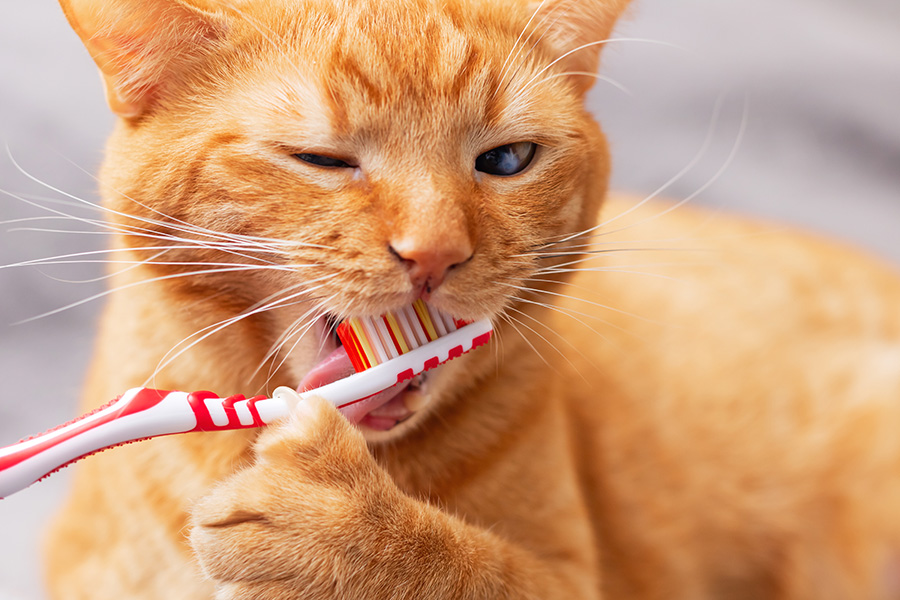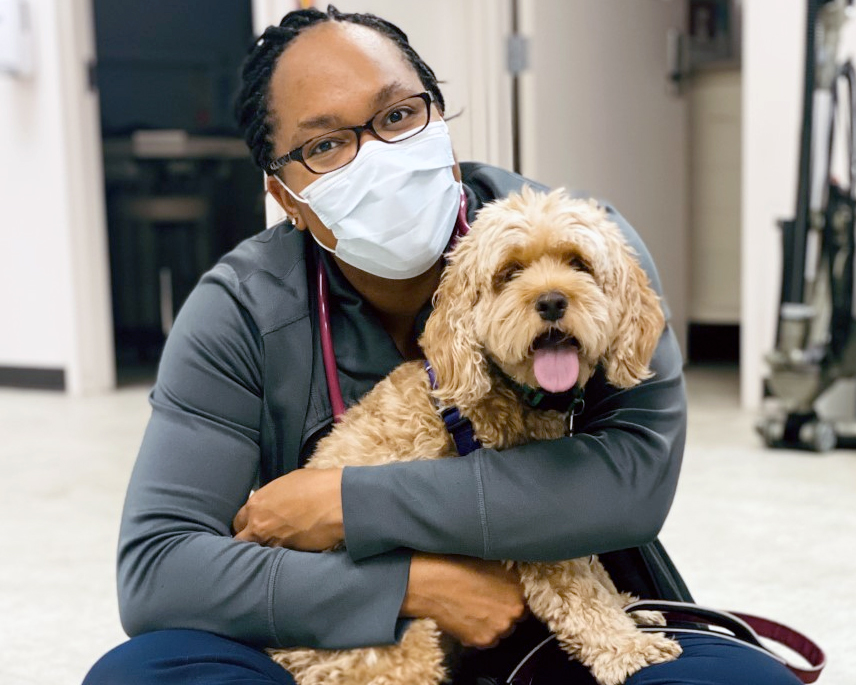Posts in Category: Pet Dental Care
Maintaining Your Pet’s Dental Health

As pet owners, we all want to ensure our furry companions live long, healthy, and happy lives. One of the most important aspects of your pet’s overall health is their dental care, yet it often goes unnoticed.
Did you know that by the time most pets are just a few years old, they may already be suffering from some form of periodontal disease? This blog will explore the significance of dental health in pets, discuss the common signs and stages of periodontal disease, and offer tips on how you can help keep your pet’s teeth and gums healthy at home.
What Is Periodontal Disease?
Periodontal disease is a progressive condition that affects the tissues surrounding the teeth, including the gums, bone, and ligaments. It begins with the accumulation of plaque and tartar on your pet’s teeth, which harbor bacteria that cause inflammation and infection in the gums. If left untreated, periodontal disease can lead to tooth loss, chronic pain, and systemic infections that can affect your pet’s overall health.
There are four stages of periodontal disease:
Stage 1 – Gingivitis: In this early stage, your pet’s gums become inflamed and red. There is no permanent damage to the teeth or surrounding tissues, but if untreated, it can progress to more severe forms of the disease.
Stage 2 – Early Periodontitis: At this stage, plaque and tartar have begun to accumulate below the gumline. Gums may recede slightly, and some bone loss may occur, but the damage is still minimal.
Stage 3 – Moderate Periodontitis: This stage is characterized by significant gum recession, further bone loss, and infection. Pets may show signs of discomfort, and tooth mobility can start to become noticeable.
Stage 4 – Advanced Periodontitis: This is the most severe stage, where there is extensive gum recession, significant bone loss, and tooth instability. Pets at this stage may experience severe pain and infection that can spread throughout their body.
Common Symptoms of Periodontal Disease
Periodontal disease often develops slowly, and many pets don’t show obvious symptoms until the condition is advanced. However, there are several warning signs to watch for:
- Bad breath (halitosis)
- Red or swollen gums
- Drooling or excessive salivation
- Difficulty chewing or reluctance to eat hard food
- Loose or missing teeth
- Pawing at the mouth or face
- Changes in behavior, such as irritability or reluctance to be handled around the mouth
One critical thing to note is that many pets, especially dogs and cats, will continue eating even with significant dental pain. This makes it even more important to be proactive about your pet’s dental care since the discomfort may not always be immediately obvious.
When Does Periodontal Disease Develop in Pets?
Studies show that periodontal disease can start as early as three years of age in cats and dogs. In fact, around 80% of dogs will have some form of periodontal disease by the time they reach three years old. For cats, around 70% show signs of dental disease by the age of three.
While these numbers may seem alarming, the good news is that periodontal disease is largely preventable with regular dental care.
The Importance of Dental Health
Maintaining your pet’s dental health is about more than just preventing bad breath and tooth loss. Untreated periodontal disease can lead to significant pain, and the bacteria from infected gums can enter the bloodstream and affect vital organs like the heart, kidneys, and liver. This can lead to systemic health issues that can shorten your pet’s lifespan.
Regular dental care can prevent these complications and keep your pet pain-free, allowing them to live a longer, healthier life. Early detection and treatment of periodontal disease are key to avoiding severe complications and ensuring your pet’s comfort and well-being.
Tips for Regular Dental Care at Home
The good news is that with a little effort, you can help your pet maintain optimal dental health at home. Here are some effective ways to manage your pet’s dental hygiene:
- Brushing Your Pet’s Teeth: Brushing your pet’s teeth is one of the most effective ways to prevent plaque and tartar buildup. Aim to brush your pet’s teeth daily using a pet-safe toothbrush and toothpaste. Start slowly, allowing your pet to get used to the process, and always use products designed for pets. (Human toothpaste contains ingredients that can be harmful to animals.)
- Water Additives: Dental water additives can be a simple solution to help reduce plaque and tartar. These additives are mixed with your pet’s drinking water and can help maintain oral hygiene with minimal effort.
- Dental Chews and Treats: Many commercial dental chews are designed to help reduce plaque and tartar through chewing action. Look for products that are approved by the Veterinary Oral Health Council (VOHC) for proven effectiveness.
- Dental Toys: There are a variety of dental toys available that help massage your pet’s gums and scrape plaque off their teeth while they play. Always ensure any toy or treat can be indented with your fingernail to ensure that it is safe enough for your pet’s teeth and won’t cause fracture of any teeth.
- Healthy Diet: Providing your pet with a balanced diet can contribute to their overall health, including their oral health. Some specially formulated dental diets can help control plaque and tartar buildup.
Professional Dental Cleanings
Even with the best at-home care, your pet will still need professional dental cleanings from time to time. Veterinarians use specialized equipment to thoroughly clean the teeth and gums, removing plaque and tartar that may be hard to reach with regular brushing. Professional cleanings are usually done under anesthesia to ensure that your pet remains still and comfortable throughout the procedure.
Dental cleanings not only help treat existing periodontal disease, but they also give your veterinarian the opportunity to spot potential issues before they become more serious. For pets with significant dental disease, extractions may be necessary to prevent further pain or infection.
Conclusion
Dental health is an integral part of your pet’s overall well-being. Periodontal disease is common, but it is also preventable with regular dental care. By brushing your pet’s teeth, using water additives and dental chews, and scheduling routine professional cleanings, you can help keep your pet’s teeth and gums healthy, prevent systemic disease, and improve their quality of life. So, take charge of your pet’s dental health today, and enjoy the peace of mind that comes with knowing you’re doing everything you can to keep them happy and healthy for years to come.
– Dr. Jeanette Barragan
Dental Care Shows Your Love

February is National Pet Dental Health Month, an annual reminder of how important dental health is in our pets. I personally love dentistry, so this month is a mini celebration for me! Dental disease is very common in dogs and cats. In fact, it is one of the most common conditions we treat in our patients. Fortunately, there is a lot that can be done to help maintain the dental health of your pets.
Around 85% of pets have periodontal disease, which is disease around the outside of the tooth. The way to prevent periodontal disease in pets is the same approach used for people: home dental care and professional cleanings. The goals of home dental care are to remove plaque from teeth and bacteria from the mouth. Without regular home dental care, the plaque on the teeth will mineralize. Eventually plaque becomes tartar, which is the hardened, solid material on the teeth. If your pet has tartar on her teeth, it will tend to have a brown/black color. The heaviest amount is seen on the back teeth.
As the tartar (also known as calculus) accumulates in the space around the tooth, inflammation and infection can develop. Ultimately there will be damage to the attachment of the tooth. By this stage, you will see redness and swelling of the gums around the teeth. You may even notice a tooth is loose. Once this occurs, a professional dental cleaning is necessary to address these teeth. Without a cleaning, the periodontal disease will continue to worsen.
The bacteria in the mouth can also affect other parts of the body, and may even lead to infection in the heart, liver, and kidneys. That is why it is vital to address any periodontal disease your pet has: this is not only a dental issue.
I hope by now I have convinced you that the dental health of your pet is an essential aspect of their health, and that you’re super excited to start your pet’s home dental routine! There are various home dental care options and below are examples you can try with your pet:
- Brushing the teeth
- Dental wipes, rinses, and pads
- Dental diets and treats
I recommend using products that are approved by The Veterinary Oral Health Council. Please visit the following website for a list of products that they have approved. Contact us if you have any questions about these home dental care options and products.
Practicing regular home dental care also helps you identify dental problems such as fractured teeth or masses in the mouth. It is a good idea to make a practice of opening your pet’s mouth and looking inside from the time your pet is young, so it becomes a comfortable process for you both.
Now onto part two, which is the professional cleaning. The type of cleaning we perform for your pet is very similar to what is done when you go to the dentist for your regular checkups, except general anesthesia is necessary with dog and cats for us to fully examine the teeth and gums and determine what treatments are necessary. Even with routine home dental care, a cleaning will eventually be needed, but the hope is that cleanings will be needed less often. A veterinarian can determine whether a dental is necessary during a regular health examination of your pet.
I recommend visiting the following website, which has a handout that discusses what the procedure involves in more detail. Please contact us if you have any further questions about the dental procedure or if you are interested in having a dental performed for your pet.
Amber Slaughter, DVM
Every Day Is Dental Care Day

With National Pet Dental Month beginning in February, the dental health of our patients is a main focus of our practice right now. While having dental procedures performed is key to help maintain dental health, home dental care is also an extremely important aspect of maintaining dental health in dogs and cats.
The goal of practicing home dental care is to prevent or control periodontal disease by reducing plaque and tartar buildup. In order to be most beneficial, this must be practiced long term. There are various home dental care options available and the combination of different methods is ideal.
The following are examples of home dental care options:
Brushing the Teeth
This is the most effective way to slow the progression of dental disease between dental cleanings. By brushing the teeth, formation of the film of bacteria on the teeth (known as plaque) is disrupted. Ideally the teeth should be brushed daily for the best results. Introducing your pet to brushing when they are younger is easiest for both you and your pet. Your pet will likely resist having the teeth brushed at first. Please remain patient and persistent, as it will take some time for them to get used to it.
Be sure to use a pet-safe toothpaste and avoid using human products. Toothpastes come in a variety of flavors, so hopefully you can find one that your pet will enjoy. You can also try a variety of pet toothbrushes styles until you find one that works best for your pet.
Dental Rinses
As with brushing, it may take time for your pet to adjust to the taste and having dental rinse applied. Some rinses taste better than others. Find one your pet likes. We recommend finding a rinse that contains chlorhexidine, which is one of the most effective antiseptics and helps prevent plaque formation on the teeth.
Dental Diets and Treats
Diets and treats formulated to address pets’ dental health rely on the shape or size of the kibble and the ingredients of the food to effective. The diets can be fed as the main diet and also as treats. Examples of prescription diets include Hill’s Prescription Dental t/d Dental Care, Royal Canin Dental Care, and Purina Pro Plan Veterinary Diets DH Dental Health. There are also over-the-counter diets and treats available without a prescription.
The Veterinary Oral Health Council’s (VOHC) Seal of Acceptance is awarded to home oral hygiene products that meet or exceed the VOHC standard for slowing down the accumulation of dental plaque and tartar. Check out these links to learn which products have the VOHC Seal of Acceptance:
Dogs – http://www.vohc.org/VOHCAcceptedProductsTable_Dogs.pdf
Cats – http://www.vohc.org/VOHCAcceptedProductsTable_Cats.pdf
Taking an active role in your pet’s dental care will help reduce dental disease and potentially life-threatening heart and kidney disease, which is why it is so important! Please contact us if you have any questions regarding home dental care for your pet.
Amber Slaughter, DVM
Image by Lynn Greyling from Pixabay
